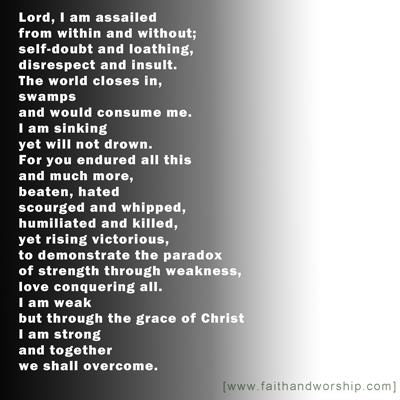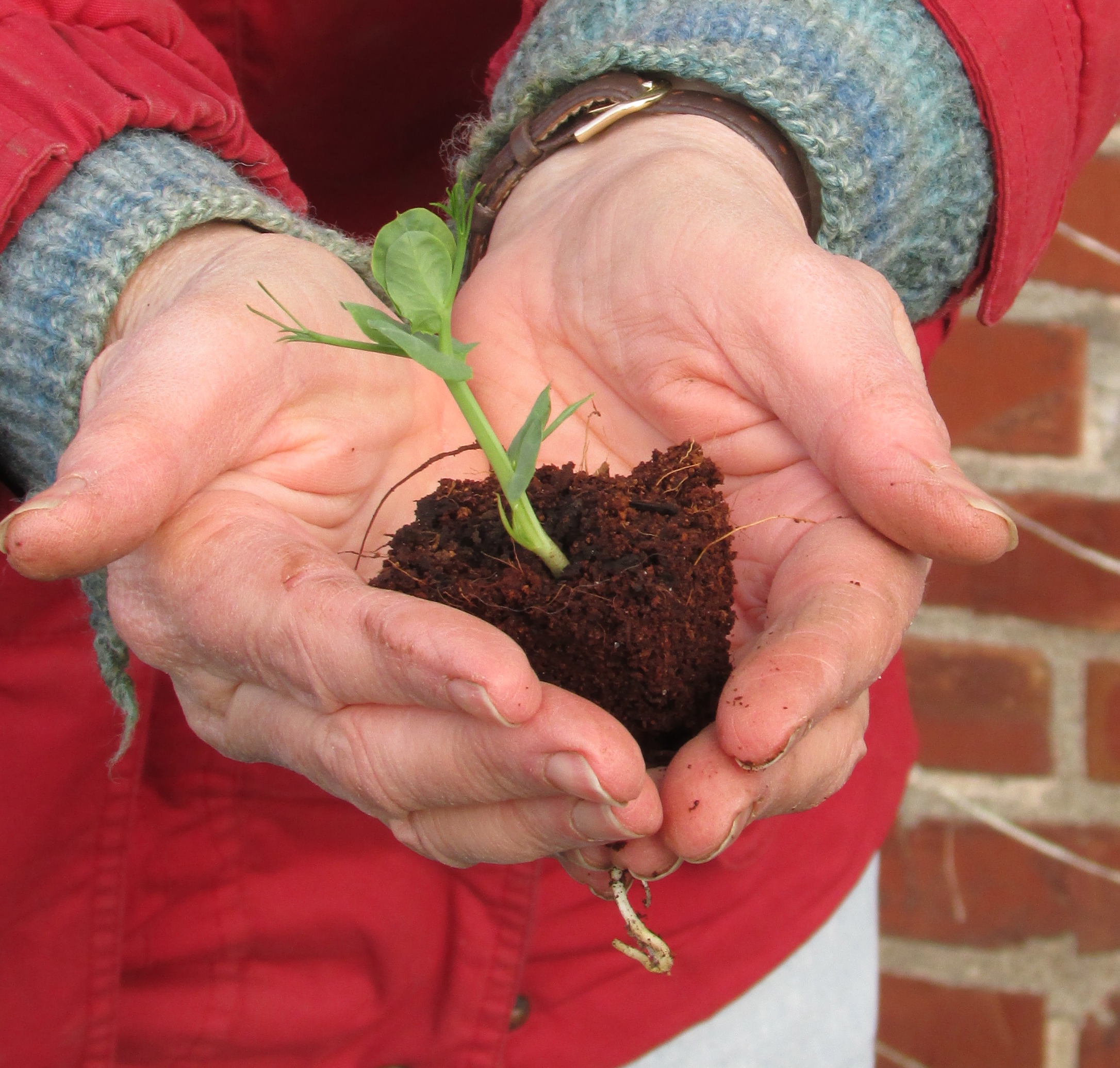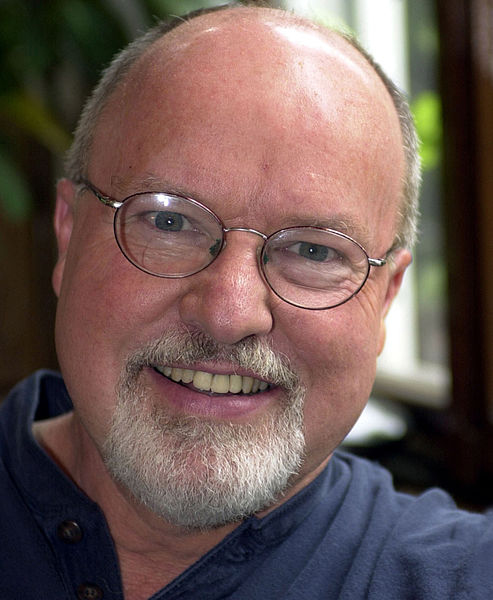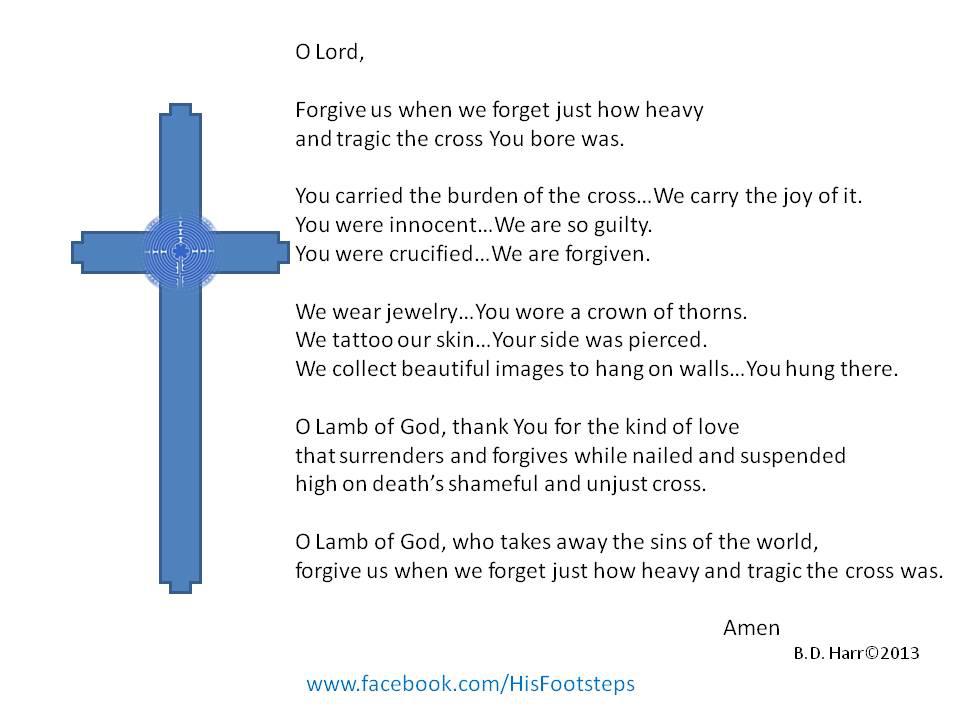Today’s prayer was written by John Birch at Faith and Worship. I find it both challenging and compelling
Today’s post in the series Return to Our Senses in Lent is written by James Prescott. James is a writer and author from Sutton, near London, UK. He blogs regularly on his own blog JamesPrescott.co.uk. He recently released his first e-book, ‘5 Steps to Encouragement: A Manifesto for Changing the World’ which can be obtained free here.
We are now into March. Overnight, it seems, the sun has come out. It shines anew, providing fresh warmth and life to the world. Where only weeks ago, the world seemed lifeless and gone, suddenly there are leaves on trees. Fresh, green, and full of life and potential.
Spring has arrived. Even in my physical body, I find myself getting slightly ill due to the changing of the climate.
We are all transitioning.
There are approximately three months between Christmas and Easter in the liturgical calendar. Three months between birth and death, and resurrection.
Three months. The same number of days Jesus was in the tomb.
And the rest of the year is nine months. The amount of time between the conception and birth of a baby.
Is this simply a coincidence? No.
For nine months there is expectation. Preparation. Living our lives in what is called ‘ordinary time’. And in this period we go from spring, the beginning of new life, to autumn and winter, the end of all life. And it is just as we hit the pinnacle of this, the shortest day, we find a new beginning.
Christmas. The coming of our Saviour. He brings new life, new beginning, new purpose and hope. For three months we focus on the life of Jesus, from beginning to painful end, and resurrection. And by the time of resurrection, new life has come all around us again.
Three months from the centre of nature’s death, to the beginning of new life. Like three days from Calvary to open tomb.
It’s strange to say it, but there is so much of calvary in Christmas. And not just in the myrrh which anoints a dead body, but in the world. There is death. More darkness. Coldness in the air (certainly in the UK winter, anyhow).
But then Jesus comes in. And within three months, life is here again in all its fullness, right about the time we celebrate resurrection.
So much of what we see in nature reflects the story of God. Even the time periods of three months and nine months have a meaning beyond the surface.
There is a cycle of birth, life, and death. And then rebirth.
And the time in between.
40 days – the traditional length of Lent, the time Jesus was in the desert, is statistically the amount of time it takes a human being to learn a new habit. If someone adopts a new habit and practices it each day for 40 days, then it will become habit.
Is it a coincidence Jesus was in the desert 40 days? Or that Lent is 40 days?
No. Because in Lent God wants us to adopt new habits. To re-orientate our lives around Him.
His story. His timetable. His plan.
And as we look at this theme of finding God in nature, let us make it a habit to look for God in every part of creation. The sunlight, the lengths of the days, the timings of the seasons.
Let us look to the rhythm of creation and find in its midst a model for God’s rhythm for us.
Light and darkness. Death and rebirth. Adopting new rhythms.
The rhythm of creation is the rhythm of God. It is the rhythm He wants us to adopt, to live our lives by. Much more than any religious or legalistic calendar we can devise. Let us open our eyes and see God right in our midst, in the rhythms of creation itself.
And we may find an intimacy and experience with God we have never seen before.
This morning I was contacted by the 24-7 prayer network about using this prayer for their five city prayer pilgrimage for the new Archbishop of Canterbury. I was delighted because this is not only one of my favourite prayers, but because I strongly believe that the formation of community based on friendship and mutual care is one of the keys to Christian formation – something that is very important for us to think about during this season of Lent.
What are you doing during this Lenten season to strength your local and global community?
Today’s post in our series Return to Our Senses in Lent, are words of wisdom from Richard Rohr. As many of you know I am very keen on breathing prayers, but it was Richard’s work on the Yahweh prayer that really inspired me. Make sure that you watch both these videos as the second is a continuation of the first and in many ways was the most inspiring for me.
—————————————————
The Jewish name for God – Yahweh – was not spoken, but breathed. Its correct pronunciation is an attempt to imitate the sound of inhalation and exhalation. We do that every moment: our first and last word as we enter and leave the world…. The one thing we do every moment of our lives is therefore to speak the name of God. This makes it our first and our last word as we enter and leave the world. (Richard Rohr: The Naked Now)
Tom and I are just back from our quarterly retreat and I just realized I have not posted a Lenten reflection for the day. So I hope you will all forgive me if I just posts the Lenten prayers that have been added to Light for the Journey over the last week. So many of them carry a sense of our pilgrimage towards the Cross that it seemed an appropriate addition to our Lenten reflections.
God we were blind but you open our eyes,
To see your glory revealed,
The wonder of your Son Jesus Christ
Who died and rose again to lead us into life.
God we were deaf but you unstopped our ears,
To hear the power of your resurrection story,
Renewal, transformation and redemption in Christ.
God we were dumb but you set free our tongues,
To rejoice and sing with all the hosts of heaven,
Holy, holy, holy is the one
Who transfigures the world with the spirit of life.
————————-
Lord Jesus Christ we worship you today.
You who are a king like no other,
We give you praise.
Born as a human child,
Raised as a refugee,
Friend of prostitutes and the marginalized.
Not seeking power and privilege,
but willing to walk the path of suffering,
To die the death of shame,
Upon a cross, crowned with thorns.
A servant king washing feet, embracing kids,
A loving God,
holding close when we stumble,
A caring and forgiving saviour,
Transforming, renewing, making all things whole,
We stand in awe of you
And give you thanks.
—————————————–
Let God sweep you up into the eternal embrace today,
Let the Son drench you with the presence of the Holy One,
Let the Spirit fill you with the life of the all loving One.
Be graced with the forgiveness of God,
Assured of the redemption of the risen Christ,
Trusting in the infilling of the Spirit.
Remember the gft of God’s Son and give thanks.
———————————————
You do not give up on us
though we might wander far,
you do not give up on us
but love us as we are
you do not give up on us
but died that we might know
you do not give up on us
because you love us so.
Today’s post in the series Return to Our Senses in Lent comes from Andy Wade, communications coordinator at Mustard Seed Associates. Andy also wears a number of other hats. He was recently awarded the “Inspired Service and Action Award” from Gorge Ecumenical Ministries for his work with the homeless in Hood River. His pastoral ministry amongst those at the margins inspires us to new levels commitment in our own lives.
—————————————–
Peanuts circa 1954, Pig-Pen enters the comic strip in a cloud of dust. We don’t know his real name… “I haven’t got a name… people just call me things.” As the dust rises around him, Pig-Pen proudly announces he’s surrounded by the dust of ancient civilizations. He is as perceptive as he is dirty.
 Like Pig-Pen engulfed in a cloud of dust, I can’t seem to shake off the dust of Ash Wednesday. Enveloped in a cloud of dust, I’m forced to join him confessing, “You know what I am? I’m a dust magnet!”
Like Pig-Pen engulfed in a cloud of dust, I can’t seem to shake off the dust of Ash Wednesday. Enveloped in a cloud of dust, I’m forced to join him confessing, “You know what I am? I’m a dust magnet!”
Like the ancients, I am also surrounded by another cloud, a “great cloud of witnesses”. And like them, and like Pig-Pen’s seemingly ever-present dust-cloud, I must “lay aside every weight and the sin that clings so closely.” (Hebrews 12:1-3)
I am a “dust magnet”. I am, we are, Pig-Pen.
Surrounded by this amazing cloud of witnesses, witnesses who share in our humanity, our brokenness, “and the sin that clings so closely”, Pig-Pen reminds me how closely related to the earth we are.
…then the Lord God formed man from the dust of the ground, and breathed into his nostrils the breath of life; and the man became a living being. And the Lord God planted a garden in Eden, in the east; and there he put the man whom he had formed. Out of the ground the Lord God made to grow every tree that is pleasant to the sight and good for food, the tree of life also in the midst of the garden, and the tree of the knowledge of good and evil. Genesis 2:7-9
I’m etched into the story as I embrace the earth from which I’m formed. I am not God. And yet I’m fashioned in God’s image, the image of the Creator. These realities must be kept in tension. And it’s this tension that grounds us as we walk into the purposes of God. As Christine Sine reminds us, “it’s only in the place of deep contemplation that we often find the resources we need to really be activists.” So I embrace the dust that I am even as I breathe in the breath of God.
And what of this dust from which I am formed? Gazing into the beauty of creation, the imagination of God unleashed dazzles the senses. Yet like this Spirit-infused-dust, the God-painted creation is no longer what it was meant to be. We share the touch of God. We share also the brokenness brought on by humankind’s desire to usurp the place of God.
For the creation waits with eager longing for the revealing of the children of God; for the creation was subjected to futility, not of its own will but by the will of the one who subjected it, in hope that the creation itself will be set free from its bondage to decay and will obtain the freedom of the glory of the children of God. We know that the whole creation has been groaning in labor pains until now; and not only the creation, but we ourselves, who have the first fruits of the Spirit, groan inwardly while we wait for adoption, the redemption of our bodies. Romans 8:19-23
It is out of these thoughts that this poem was born. It is also out of this contemplation that I wait, watch, anticipate the next steps in the unfolding imagination of God.

remember you are dust
and to dust you shall return
marked with ash of repentance
death
dust of mourning
confronted with our mortality
an urn filled with ash
poured out
scattered over water, earth
anointed
creation groans
expectantly waiting
painfully longing
for the full redemption
of this dust
infused with the breath of God
Today’s post in the series Return to Our Senses in Lent comes from my husband Tom Sine, futurist, author and hospitality guy here at the Mustard Seed House.
“Ashes to ashes” are the words I heard again on Ash Wednesday last week as my pastor placed an ash cross on my forehead. As I turn 77 this week I am much more aware of my mortality than I was a decade ago.
 Christine led a very inspirational retreat called Return to Our Senses in Lent at our home a couple fo weeks ago with a few MSA friends. It was during this session that I discovered a new way of reflecting on my own mortality… expressing my deep appreciation to God for family members, friends and mentors that have added so much to my life.
Christine led a very inspirational retreat called Return to Our Senses in Lent at our home a couple fo weeks ago with a few MSA friends. It was during this session that I discovered a new way of reflecting on my own mortality… expressing my deep appreciation to God for family members, friends and mentors that have added so much to my life.
Those of us who knew Richard Twiss were shocked by his unexpected death while attending the Presidential Prayer Breakfast in Washington DC. We pray for the huge loss Richard’s death will have particularly for his family. Those of us who knew him are deeply grateful for his life of service to Christ and his strong prophetic voice to call us all out of the values of the dominant culture to embrace a more biblical faith.
I start every morning by inviting the great family beginning with Abraham and Sarah to join me in my prayers. On Saturday at our Lenten Retreat I focused on my mortality by giving thanks for family, friends and mentors that have joined that great family. I started by expressing my deep gratitude for my dear parents Tom whom I lost in 1990 and Katherine in 1995. My hardest loss was my son Clint in 2006. But I still celebrate his good life and memories of camping at Baker Lake and touring the UK.
In the last 5 years I also lost two of my most significant mentors from my student days at Cascade College in the 50s…Grace and Lee Nash. Grace helped a young man who had little prospect of succeeding in college get his life organized. Lee was so affirming as I became an author and so gracious when I fell on my face.
Edward Lindeman came as President to Whitworth College in 1970 as I arrived in Seattle to start my doctorate at the University of Washington. He was easily the most creative college educator I ever met. He had headed the Apollo Space Craft Project and mentored me researching and writing about the future.
Frank Herbert author of the Dune series was the first professor in my doctoral program at the UW in 1971 in a course on Utopia and Dystopia. We continued to be friends and he was a valued mentor in my life and writing after he and Beverly moved to Port Townsend to create what he called a high level of “techno-peasantry.”
Just a few weeks ago I joined hundreds of people in the most multi-cultural event I have ever attended in Seattle as we celebrated the life of Cal Uomoto. I had known Cal since the early 70s . I can’t remember having a friend that was a more self effacing servant of Jesus than Cal. Over his lifetime thousands of refugees from all over the planet experienced his care and hospitality.
As you reflect on your own mortality during this season of Lent will you write and tell me some of those whose lives you are celebrating?
As an Amazon Associate, I receive a small amount for purchases made through appropriate links.
Thank you for supporting Godspace in this way.
When referencing or quoting Godspace Light, please be sure to include the Author (Christine Sine unless otherwise noted), the Title of the article or resource, the Source link where appropriate, and ©Godspacelight.com. Thank you!





